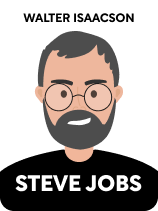

This article is an excerpt from the Shortform book guide to "Steve Jobs" by Walter Isaacson. Shortform has the world's best summaries and analyses of books you should be reading.
Like this article? Sign up for a free trial here.
Looking for Steve Jobs book quotes? How will these quotes inspire you to think outside the box?
Steve Jobs, as co-founder and CEO of Apple, was a guiding force in the electronics industry, from the development of the first home computers in the 1970s to the world-shaking impact of smartphones and tablets. The decisions Jobs made and the passions he followed had a direct impact on the way we use computers and share information.
Let’s look at some quotes from Steve Jobs’s biography, written by Walter Isaacson.
Steve Jobs by Walter Isaacson Quotes
From the first home computers to the smartphone revolution, Steve Jobs was a guiding force in the worldwide electronics industry. To understand Jobs’s life is to understand why the modern information landscape functions the way it does.
Walter Isaacson’s biography is considered to be the definitive work on Steve Jobs’s life. He was given full access to Jobs and those who knew him with no limitations on what he might uncover. The result is an intimate portrait of a man who was thoughtful and callous, insightful and blind, and whose passions left a mark on the world.
Below are Steve Jobs book quotes that will help you better understand the entrepreneur.
“If you want to live your life in a creative way, as an artist, you have to not look back too much. You have to be willing to take whatever you’ve done and whoever you were and throw them away. The more the outside world tries to reinforce an image of you, the harder it is to continue to be an artist, which is why a lot of times, artists have to say, “Bye. I have to go. I’m going crazy and I’m getting out of here.” And they go and hibernate somewhere. Maybe later they re-emerge a little differently.”
In addition to his passion and insight, Isaacson argues that the intellectual gift Jobs brought to the table was his interest and obsession with the aesthetics of design. The principles of design that Jobs imbued in all his products were craftsmanship, simplicity, and emotional expression. As a person who’d always found himself with one foot in the “tech nerd” camp and the other in the arts, Jobs was uniquely positioned to be the bridge between the two.
Isaacson states that Jobs’s father, a machinist and auto mechanic, instilled in him an appreciation for well-thought-out design. Included in this was the idea that when building something, whether a car or a cabinet, even the parts that would never be seen should be as finely crafted as the parts that were visible. When translating this idea to computer design, Jobs insisted that a computer’s interior, down to the layout of the circuit board itself, should be as aesthetically pleasing as it was functional.
Jobs was heavily influenced by the Bauhaus architecture school, which melded modernist principles of art with functionality. Key to this were values of simplicity and elegance. One often repeated story is that Jobs’s inspiration for Apple’s early designs came from a sleek food processor he’d seen at Macy’s. Isaacson argues that in Jobs’s mind, engineering and design went hand in hand and couldn’t be separated from each other.
According to Isaacson, Jobs’s merging of form and function didn’t stop at the physical design of his products but went on to include the user interface. From the Macintosh forward, Jobs ensured that his products felt natural and intuitive to anyone who picked them up. When the iPhone and iPad were introduced, Jobs confirmed that everything about their design was such that nothing distracted from the screen, even though it introduced engineering challenges that could have been avoided with a larger, clunkier outer casement.
For Jobs, creating the products themselves was not the end of his expression of design. He wanted to design the user experience itself, from start to finish. Apple’s original backer, Mike Markkula, had taught him that every product and interaction with the customer should communicate the value of the company. Isaacson claims that this led Jobs to take a controlling hand in product launches, advertising, sales, and even packaging.
“Steve Jobs: ‘The best way to predict the future is to invent it.’”
Steve Wozniak and Jobs introduced the Apple I at the Homebrew Computer Club, where it caught the attention of a local computer dealer. Jobs’s parents’ garage became their first factory, where friends and family became the assembly line to manufacture the Apple I circuits.
Already thinking ahead, Jobs decided their next model should be a fully integrated system that required no assembly by the user. He intended to take the personal computer from a hobbyist’s toy to a product for the general public. He and Wozniak went into business with Mike Markkula, formerly at Intel, to fund Apple’s expansion and production costs. (Shortform note: Mike Markkula, Apple’s unsung third founder, was often thought of as “the adult in the room” to mediate between Jobs and Wozniak, though he was also a programmer and engineer.)
The Apple II debuted in 1977, kicking off the personal computer industry. (Shortform note: While Apple may have launched the personal computer into the public eye, it was not the only company in the market. Tandy’s TRS-80 was released a month after the Apple II, with the Commodore PET following in December. All three ran versions of the programming language BASIC, and are collectively known as the 1977 Trinity.)
“Steve Jobs had a tendency to see things in a binary way: “A person was either a hero or a bozo, a product was either amazing or shit.”
Despite the brilliance of Jobs’s leaps of insight, his belief in the power of his own intuition let him fall into the trap of binary “either/or” thinking. Isaacson argues that this temperament colored not only Jobs’s vision of the future but the way he treated the people around him. In Jobs’s eyes, every person he met was either a genius or an idiot. Every idea was either brilliant or rubbish. Every product was either the best or it was garbage.
Jobs was vocal about his opinions and would use them to build people up or tear them down, sometimes on the very same day. This type of behavior was particularly manipulative—Jobs would berate a hapless colleague, then later put them on a pedestal. This made people eager to please him and terrified of failing to do so.

———End of Preview———
Like what you just read? Read the rest of the world's best book summary and analysis of Walter Isaacson's "Steve Jobs" at Shortform.
Here's what you'll find in our full Steve Jobs summary:
- A no-fluff look into the life of Steve Jobs
- How Jobs changed the technology landscape
- What it was like to work with and for Steve Jobs






